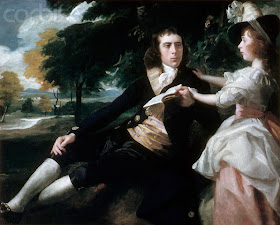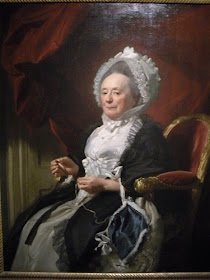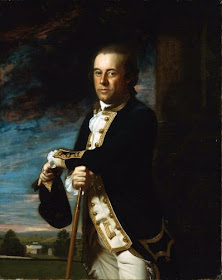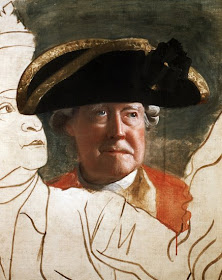
Most Americans know John Singleton Copley from his famous portrait of his contemporary, Paul Revere (above). That's a pity because the Revere portrait was done while Copley was still leaning how to paint, and it's far from being his best work.

Copley was an idealistic realist, a tradition that goes back at least as far as Rome. The Romans sculptors gave us portrait busts (above) that were startlingly realistic, and yet were overlayed with an ideal that most of the subjects shared, one which placed great value on being practical men of action.

Copley reminds me of another realist, Holbein. Thanks to Holbein we have what must be a starkly realistic depiction of the characters at Henry VIII's court. That's Thomas Moore above.

I'll mention in passing that Copley painted a number of famous seascapes (above) dealing with shark attacks.

If the Romans made portraits showing men of action, Copley made portraits (above) showing men of determination and thought. Copley loved to paint IQ points.

It's odd that a painter can be a realist and still skewer his portraits (above) in a direction that reflects what the painter himself thinks is valuable in life. Copley clearly values intellect and drive. These are no nonsense people who get things done.

Copley was an American who emmigrated to England just before the Revolutionary War. He taught himself how to paint from the engravings in books and the small number of European oil paintings that managed to find their way over here.

Once in England he soaked up the European styles like a sponge. You can see the influence of Gainsborough and even Rubens here (above). Boy, look how stiff the girl in the picture is! How did that happen?

This (above) is an interesting character study. The man shows diligence, judgement, wit and humanity.

I can't get over how real these pictures (above) seem. To judge from Copley people back then looked just like we do.












There's a huge gallery of his paintings at the museum near me. He's interesting because in a lot of his paintings he rendered some things so beautifully and other things are done sloppily.
ReplyDeleteLike this one, Boy With Squirrel. It's just odd that someone would paint chain links in perfect perspective but attach them to a weird rodent that doesn't look like a squirrel but a mouse with a pipe cleaner tail and a boy with an eye that's growing out of his sinuses.
I wonder who ripped off the Revere Portrait for the Samuel Adams beer label/logo. I think I plastered the Paul Revere painting on some Homebrew for that reason at one point a decade ago or so.
ReplyDeleteAs to adams content, it seems that woodcuts and engravings are especially prone to the "lets draw the beast without having any reference to the real thing whatsoever". It is a bit less likely once painting runs to this level of realism, but still fairly prevealent throughout the victorian era.
Perhaps photography made the portrait artists and such realize they could not get away with providing 'cartoony' imaginings for 'less important' parts of the image anymore.
Adam: True, some parts are amazingly detailed and others look like they were turned out as an afterthought. Look at the hazy drapery and trees! Maybe this is the influence of Gainsborough and Rubens.
ReplyDeleteAlso true that the squirrel is done so badly that it damages the picture.
I am amazed that "Boy With Squirrel" has yet to become the logo for some hip, coked-out Hollywood boutique production company. The kind of place that ends with its founder's severed head on the hood of a Ferrari at 3 a.m. Oh, well, one can dream.
ReplyDeleteThat painting of Sir Thomas Moore was almost like a photo. It's BEAUTIFUL!
ReplyDeleteIt's amazing how you can see his subjects thinking.
ReplyDeleteThe Paul Revere portrait must have seemed as radical as the man himself in those days. He's in shirtsleeves with a visible tan line on his wrist & his humble tools in front of him. He looks like it just suddenly occurred to him, "Hey, what if I just don't pay my tea tax?".
Was Copley political?
I guess Eakins would be next in line after Copley for this type of realism. The "intelligence", or "scientific " quality in Copley really develops with Eakins.
ReplyDeleteThese are some great paintings for sure! I agree with Adam that Boy with Squirrel was of the more sloppy side of things, but the squirrel he painted is of the flying variety, and is a great depiction actually. If you look closely you can see the extra skin between its arms, folded up. And the tail fits too. I had to google flying squirrel to make sure my memory served me right. I know that wasn't the point of his comment though, I'm just an animal biologist, so... :) Great post!
ReplyDeletehttp://www.youtube.com/watch?v=Enf3zyziKQM&feature=related
ReplyDeletehttp://www.youtube.com/watch?v=7Kw4IE8Sr1Q&feature=related
ReplyDeletejohn k would love this
I've always loved Copley's self-taught style. He see seems more of a standout than contemporaries like Gainsborough and Reynolds. He seems to share this with a lot of American artists.
ReplyDeleteJ J Audubon:
http://www.mcq.org/audubon/menu.html
Joseph Cornell:
http://josephcornell.org/boxes/index.html
Grant Wood (imitating Copley?):
http://www.cartermuseum.org/works-of-art/1970-43
On a different note, have you seen these, Eddie?
http://users.telenet.be/autochromes/bio_corbet.htm
I Love Copley. There are loads of his works on display in Philadelphia-did you see them there as a yout'?
ReplyDeletePersonally I believe these sitters were every bit as intelligent as they look-intelligent and successful. You had to be to have a formal portrait done by the preeminent portraitist in America.
Re: this quote:"Even his old women (above) look like they have enormous inner strength"-wouldn't you expect the older/elderly women (of all people) in those times to have the greatest inner strength? I surely would!
As for the languorous woman who looks bored: sitting for a painter is the most tedious thing in the world, especially for a busy young woman who's not a professional model. It's why painters like Reynolds, etc reused "costumes"/bodies of sitters and spent almost all their time on the faces-they couldn't persuade or expect the VIPs to pose for more than a few hours at best.
What's your favorite book on Copley? Have you been to the Huntington yet? How many of my queries will you answer? ; )
Nice post Eddie. But isn't the painting of the shark more famous than the one of Paul Revere?
ReplyDeleteJenny: I haven't been to the Huntington for years! The last time I went there was with John soon after we first met. The gallery was closed when I was there but "Blueboy" was on exhibit and was visible from the open door. Does the Huntington have any Copley paintings?
ReplyDeleteStephen, Anon: I have to run, but I'll check out those links when I get back!
This comment has been removed by a blog administrator.
ReplyDeleteYes, there are Copleys there at the Huntington. Their speciality seems to be that period. I used to be a member(they stlll are kind enough to send me their schedules of events etc), but I haven't been in 2 years(when we walked out to our car with Drew Barrymore of all people-what a girl)...they've renovated the house and I'm dying to see it. We should get a party together and go.
ReplyDeleteI'll bet you haven't seen the former bank/current museum with all the many Copleys in the Old Town part of Philly, have you? It's splendid.